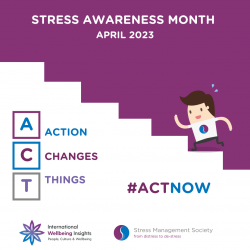

April is National Stress Awareness Month, which has been held every April since 1992 to raise awareness of the causes and cures for our modern-day stress epidemic.
It provides an opportunity for an open conversation on the impact of stress and to remove guilt, shame and stigma around mental health.
This years theme is #ACTNOW as Action Changes Things. It is an invitation to go beyond talk and campaign for taking action and personal responsibility in creating a positive change, with the aim to create an opportunity for us to consider how we are going to do something to make things better.
30 day challenge
The Stress Management Society encourages people to spend April taking part in their 30 day challenge, where you pick one action each for your physical, mental and emotional wellbeing to carry out every day.
It takes 30 days to turn actions into habits, so this challenge maximises the chances of turning knowledge and techniques into positive behavioural change. The Society provides free resources that can be downloaded for the challenge, including a daily de-stress planner, a stress guide, and a seven step achievement plan.
What else can I do for Stress Awareness Month?
Other than the 30 day challenge, here are some other activities the Society encourages us to take part in:
Bupa provides the following ten tips for managing stress:
How does stress affect your business?
Stress is one of the most common causes of long-term work absence in the UK.
Supporting employees who are feeling stressed can help you to understand what is making them feel this way. Practical steps can then be taken to address this and help employees feel more positive and productive at work.
Whether a small business or a large corporation, the law requires all employers to prevent work related stress to support good mental health in the workplace.
There are six areas to consider which can cause work related stress:
The Health and Safety Executive's (HSE) Working Minds campaign
The HSE's Working Minds campaign recommends employers follow these steps to support work-related stress:
Liz Goodwill, Head of the Work-Related Stress and Mental Health Policy Team at HSE, said: "Stress Awareness Month is an opportunity for employers to check in and support their staff's mental health".
"There are six main areas that can lead to work-related stress if they are not managed properly. These are: demands, control, support, relationships, role and change. Factors like skills and experience, age, or disability may all affect someone's ability to cope".
For more information on this subject, see: